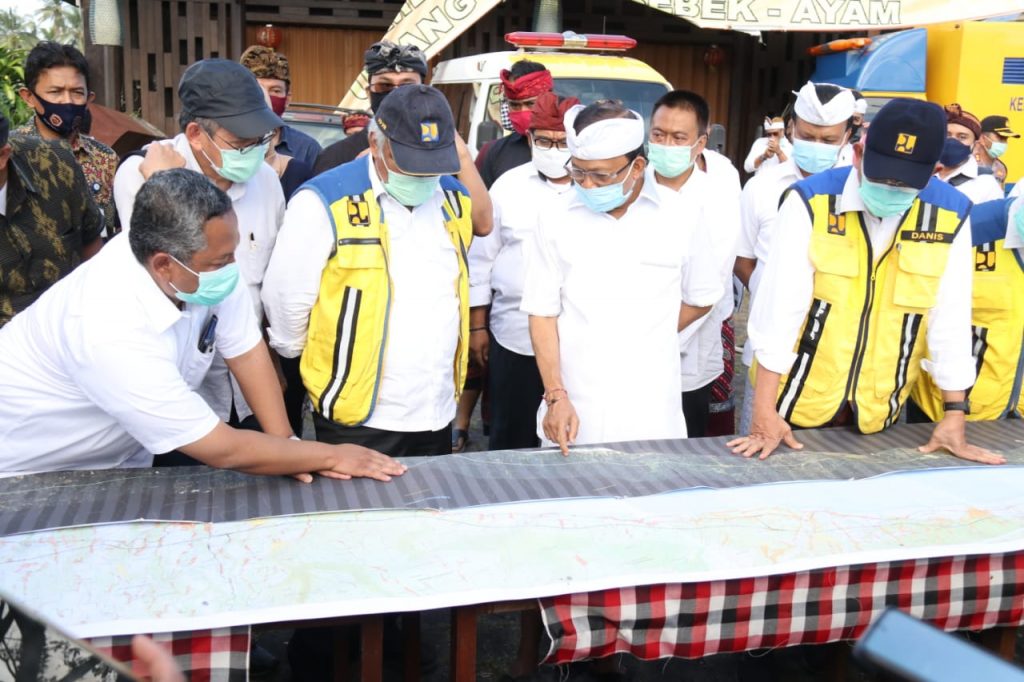DENPASAR – After reviewing the construction of infrastructure projects at three different locations, namely the planned development of the Besakih Area (Karangasem), the development of the Dipta Captain Stadium (Gianyar) and the construction of the Delok Sidan Dam (Petang, Badung), Bali Governor Wayan Koster with the Minister of Works Public and Public Housing of the Republic of Indonesia (PU PR) Basuki Hadimuljono reviewed the infrastructure development plan for the Mengwi – Gilimanuk Toll Road in Mengwi Village, Badung, Thursday (6/8/2020). With the construction of this toll road, it will add another toll road that has been owned by Bali before, the Bali Mandara Toll Road.
During the visit to the media crew, Bali Governor Wayan Koster revealed that the toll road development plan is a necessity to unravel the congestion spots that often occur during busy hours, as well as realizing fast access to Denpasar and the opposite direction from Denpasar waiting for Gilimanuk.
“This plan is as needed, realizing fast road infrastructure access for time and cost efficiency. During normal times, now the travel time from and from Gilimanuk is more than three hours. If there are large vehicles with heavy loads moving slowly, it will cause a long queue of vehicles behind them. I am sure, this will be good for the development of the Bali region. When the tourist visiting season to Bali is high, I think there will be no more traffic jams if there are tolls, ”explained Governor Koster.
Accompanied by the Regional Secretary of the Bali Province Dewa Made Indra, the Governor from Sembiran Village, Buleleng again explained the development plan which will be divided into three stages. Namely the first stage as a priority includes the path of Pekutatan – Soka, the second stage is continued covering Soka – Mengwi which then ends the Pimanatan Gilimanuk path. The total road to be built is more than 90 km long.
“We prioritize the Pekutatan – Soka route, because traffic jams often occur along that route, as well as a high accident rate. This path is about 20 km in length from a total of about 90 km. The total cost is budgeted around 14 trillion more. That does not take any budget, both from the Center and the regions, because everything is built with private initiatives, “explained Governor Koster.
The toll road development plan will also be developed again in the next plan for the Mengwi – Gianyar route so that inter-regency access can be reached as short as possible. “For the land acquisition, the provincial government (Bali, red) will fully finance it.
I think the development will be fast, just waiting for land acquisition. But there are still steps before that that must be completed. Hopefully this can be done quickly so as to more quickly realize the balance and economic equality of all regions in Bali, both from West to East, and from South to North of Bali Island, for the overall progress of Bali, “said Governor Koster.
The Minister of Public Works, Basuki Hadimuljono, said that the construction of the Mengwi – Gilimanuk toll road is a stage of development between regions and between regions, including supporting the connection between Java and Bali.
“This is a matter for the Trans Java route, which currently has reached Pasuruan, the plan is to reach Ketapang. If it goes well until Ketapang, of course, tourist visits will increase. For this reason, Bali needs supporting facilities so that it doesn’t get more congested. If access is available, I am sure there will be more people who are interested in Bali, it is more economical to be able to leave a family than take a plane, while enjoying the view, “he said.
According to him, the stage that has been carried out now is the feasibility study (FS) test permit. When it is finished, it will proceed with the initiative permit and the determination of the location permit. Then, in October, a tender is planned to be carried out, and construction can begin to be carried out in March 2021, which begins with the signing of a contract. “The first phase is planned to be completed by the end of 2021. And we encourage private non-state-owned investment initiatives to invest. If needed, it will be equipped with two-wheeled vehicle facilities as well, which of course is equipped with a level of security for two wheels, “he concluded.
Editor: Igo Kleden


